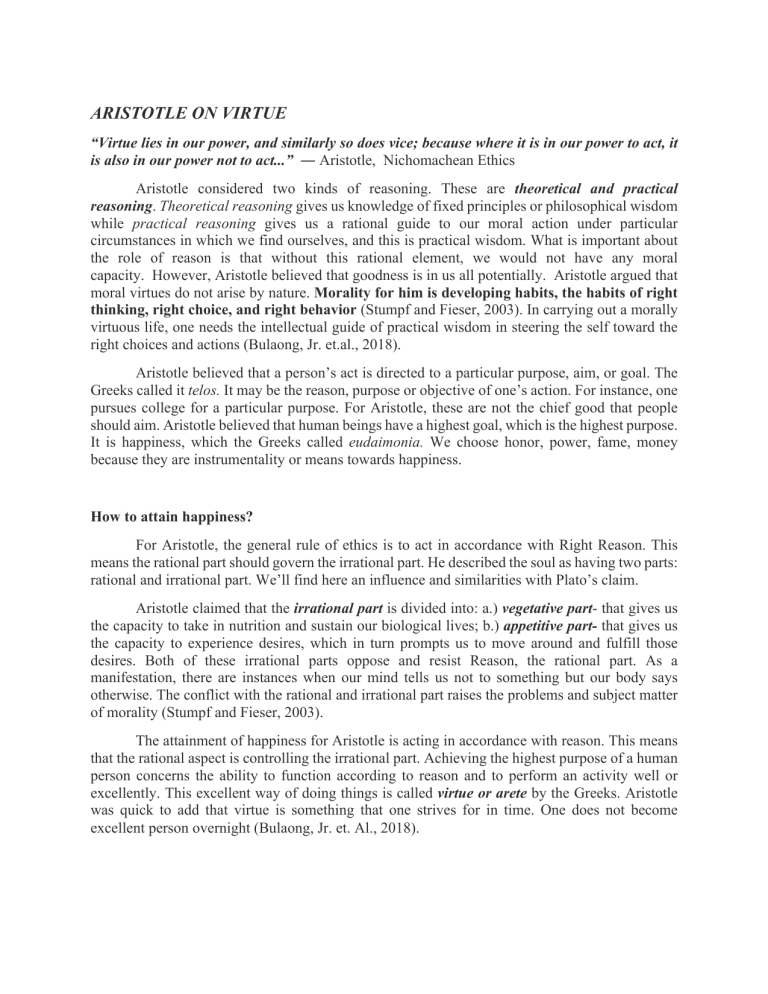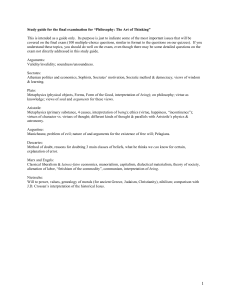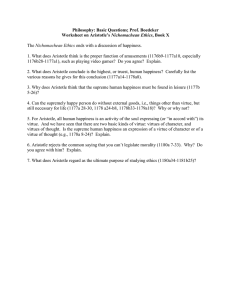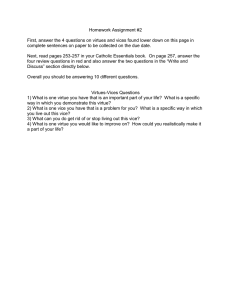
ARISTOTLE ON VIRTUE “Virtue lies in our power, and similarly so does vice; because where it is in our power to act, it is also in our power not to act...” ― Aristotle, Nichomachean Ethics Aristotle considered two kinds of reasoning. These are theoretical and practical reasoning. Theoretical reasoning gives us knowledge of fixed principles or philosophical wisdom while practical reasoning gives us a rational guide to our moral action under particular circumstances in which we find ourselves, and this is practical wisdom. What is important about the role of reason is that without this rational element, we would not have any moral capacity. However, Aristotle believed that goodness is in us all potentially. Aristotle argued that moral virtues do not arise by nature. Morality for him is developing habits, the habits of right thinking, right choice, and right behavior (Stumpf and Fieser, 2003). In carrying out a morally virtuous life, one needs the intellectual guide of practical wisdom in steering the self toward the right choices and actions (Bulaong, Jr. et.al., 2018). Aristotle believed that a person’s act is directed to a particular purpose, aim, or goal. The Greeks called it telos. It may be the reason, purpose or objective of one’s action. For instance, one pursues college for a particular purpose. For Aristotle, these are not the chief good that people should aim. Aristotle believed that human beings have a highest goal, which is the highest purpose. It is happiness, which the Greeks called eudaimonia. We choose honor, power, fame, money because they are instrumentality or means towards happiness. How to attain happiness? For Aristotle, the general rule of ethics is to act in accordance with Right Reason. This means the rational part should govern the irrational part. He described the soul as having two parts: rational and irrational part. We’ll find here an influence and similarities with Plato’s claim. Aristotle claimed that the irrational part is divided into: a.) vegetative part- that gives us the capacity to take in nutrition and sustain our biological lives; b.) appetitive part- that gives us the capacity to experience desires, which in turn prompts us to move around and fulfill those desires. Both of these irrational parts oppose and resist Reason, the rational part. As a manifestation, there are instances when our mind tells us not to something but our body says otherwise. The conflict with the rational and irrational part raises the problems and subject matter of morality (Stumpf and Fieser, 2003). The attainment of happiness for Aristotle is acting in accordance with reason. This means that the rational aspect is controlling the irrational part. Achieving the highest purpose of a human person concerns the ability to function according to reason and to perform an activity well or excellently. This excellent way of doing things is called virtue or arete by the Greeks. Aristotle was quick to add that virtue is something that one strives for in time. One does not become excellent person overnight (Bulaong, Jr. et. Al., 2018). Virtue as the Golden Mean Excerpts from the book Socrates to Sartre and Beyond (pages 93-94) Human passions are capable of a wide range of action, all the way from too little to too much. Consider our appetites for food. On the one hand we can become dominated by an excessive desire to eat. On the other hand we can have a deficiency in our appetite for food to the point of starvation. The proper course of action--that is, the virtuous course-- is the middle ground or mean between excess and deficiency. We should seek out this middle ground with all of our passions, such as those of fear, confidence, lust, anger, compassion, pleasure, and pain. When we fail to achieve this middle ground, we expose ourselves to vices of excess or vices of deficiency. We control our passions through the rational power of the soul, and thereby form virtuous habits that lead us to spontaneously follow the middle course. The virtue of courage, for example, is the mean between two vices: cowardice (a deficiency) and rashness (an excess). Virtue, then, is "a state of being, "a state apt to exercise deliberate choice, being in the relative mean, determined by reason, and as the person of practical wisdom would determine." Therefore, virtue is a habit of choosing in accordance with a mean. The mean is not the same for every person, nor is there a mean for every act. Each mean is relative to each person to the degree that our personal circumstances vary. In the case of eating, the mean will obviously be different for an adult athlete and toddler. But for each person, there is nevertheless a proportionate or relative mean, which is the virtue of temperance. This stands between two extreme vices, namely, gluttony (excess) and starvation (deficiency). Similarly, when we give money, liberality is a virtuous mean between the vices of prodigality and stinginess. There is no fixed amount of money that constitutes the virtue of liberality; instead, the dollar figure is relative to assets. Although a large number of virtues stand between two extreme vices, there are other actions that have no mean at all. Their very nature already implies badness, such as spite, envy, adultery, theft, and murder. These are bad in themselves and not in their excesses or deficiencies. We are thus always wrong in doing them. Moral virtue, then, consists of cultivating habits which will spontaneously incline us to take the middle course of action- or simply avoid bad conduct in the case of actions like theft and murder. Plato had listed four main virtues (later called "cardinal" virtues), which Aristotle also endorses, namely courage, temperance, justice, and wisdom. In addition to these, Aristotle also discusses the virtues of magnificence, liberality, friendship, and self-respect (Stumpf and Fieser, 2013). In short, moral virtue is a state of character concerned with choice, lying in a mean, that is, the mean relative to us, this being determined by a rational principle, and by that principle by which the man of practical wisdom would determine it. -Aristotle, Nichomachean Ethics.




